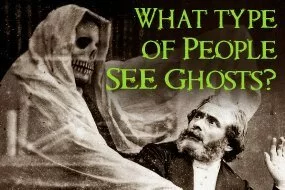Are there certain types of people who see ghosts? If so, who are they - what are their traits or tendencies?
 Quick answer: Research has shown there may be a specific type of person who is more vulnerable to seeing ghosts. If you are an anxious or stressed out individual, or a magical thinker, you are more likely to see a ghost.
Quick answer: Research has shown there may be a specific type of person who is more vulnerable to seeing ghosts. If you are an anxious or stressed out individual, or a magical thinker, you are more likely to see a ghost.
All sorts of people see ghosts, and it doesn't matter their social standing, profession or religious affiliation. But the way we perceive ghosts seems to be influenced by social class, religious beliefs and the media. And stress, anxiety, is apparent with those who have seen ghosts.
Stress during loss of a loved one, especially mentally-created ghosts of grief, could also be a factor in some ghost sightings.
Greatly paraphrasing research from Barnes and Gibson of the University of Cambridge (a 2012 paper, Things that go bump in the night: Who reports supernatural agency experiences and why?), we would like to share our opinion about this topic, though we may disagree, in part, with their findings.  Admittedly, we are only pulling out of the survey the part that pertains to this article and, to be fair, we certainly are not presenting all of the data.
Admittedly, we are only pulling out of the survey the part that pertains to this article and, to be fair, we certainly are not presenting all of the data.
Barnes and Gibson conducted a survey of 583 persons primarily from Britain (predominately female, 50% not holding any religious beliefs), asking them if they ever had a supernatural experience and, if so, to describe it. They also requested participants to undergo some personality testing.
Let's just say that even though the concept was good and the results interesting, we find they (the conclusions) do not tell the whole tale.
The Survey Results for Seeing Ghosts
Barnes and Gibson noted in the survey that non-religious, supernatural entities (ghosts) were often seen when the witnesses were isolated in a darker, quiet or even menacing environment. Most of the ghost sighting witnesses reported being nervous or fearful at the time. (In contrast, if witnesses perceived a religious figure, e.g. an angel, or Jesus, they naturally felt more at peace.)
So, the survey concluded that if you are a nervous person, you might have the tendency to see specters. They also found that people who tend to believe in magical-type thinking also tend to see ghosts and spirits.
CONCLUSION? INCONCLUSIVE?
Yes, the survey could indicate that grief, anxiety and other forms of fear might cause some of us to see ghosts. And, while we believe this to be true, the data could also substantiate that when most of us see a ghost, it's natural for us to feel fearful and nervous.
And we might add that if most of us saw the visage of a respected religious figure (e.g. Mother Teresa), we would likely feel less distressed, unthreatened and in awe.
